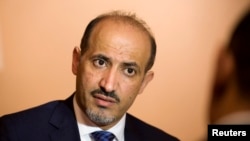Representatives from Syria's government and opposition are set to begin talks in Geneva on Friday, but they will not meet face-to-face for the first time, as initially planned.
United Nations officials said Friday that the two parties would instead meet in separate rooms, with United Nations peace mediator Lakhdar Brahimi shuttling back and forth.
The rival delegations have shown no sign of compromise and have threatened to pull out of the long-delayed peace talks, which began Wednesday with feisty opening statements in Montreux.
The oppositon said it will not negotiate directly with the Syrian government, unless it agrees to discuss the departure of President Bashar al-Assad. Damascus has refused, accusing the rebels of supporting terrorism.
Syrian National Coalition President Ahmad Jarba on Thursday declared there should be no doubt the Syrian "regime is dead," but also said it is important the talks move forward.
"The negotiations will be difficult. There is no easy negotiation. But the road of one thousand miles starts with one step," said Jarba.
Syrian opposition and government representatives met separately Thursday with Brahimi, a veteran Algerian diplomat, who had previously expressed hope that both sides would be able to meet Friday for the first time since the civil war began.
The official goal of the so-called Geneva 2 talks is to form a Syrian transition government, though analysts say the chances for achieving this goal are slim. Instead, more modest achievements, such as allowing humanitarian aid to civilians, are expected.
Meanwhile, al-Qaida leader Ayman al-Zawahri called on Syrian rebels to stop their infighting and focus on the battle against President Assad. Al-Zawahri delivered the message in an audio recording posted on websites used by militant groups.
Al-Qaida-linked insurgents, who do not recognize the peace talks, have clashed in recent weeks with other rebel groups fighting against the Syrian government, leaving hundreds dead.
The United States and Russia have led the effort to organize the Geneva talks on the basis of an agreement reached at a 2012 conference to find a peaceful solution to the Syrian crisis. The document contains a series of steps, including the negotiated transitional government, a ceasefire and a commitment to allow full humanitarian access.
The Syrian conflict began in March 2011 as peaceful protests before spiraling into a civil war that the U.N. says has killed well over 100,000 people and forced nearly 9 million from their homes.
United Nations officials said Friday that the two parties would instead meet in separate rooms, with United Nations peace mediator Lakhdar Brahimi shuttling back and forth.
The rival delegations have shown no sign of compromise and have threatened to pull out of the long-delayed peace talks, which began Wednesday with feisty opening statements in Montreux.
The oppositon said it will not negotiate directly with the Syrian government, unless it agrees to discuss the departure of President Bashar al-Assad. Damascus has refused, accusing the rebels of supporting terrorism.
Syrian National Coalition President Ahmad Jarba on Thursday declared there should be no doubt the Syrian "regime is dead," but also said it is important the talks move forward.
"The negotiations will be difficult. There is no easy negotiation. But the road of one thousand miles starts with one step," said Jarba.
Syrian opposition and government representatives met separately Thursday with Brahimi, a veteran Algerian diplomat, who had previously expressed hope that both sides would be able to meet Friday for the first time since the civil war began.
The official goal of the so-called Geneva 2 talks is to form a Syrian transition government, though analysts say the chances for achieving this goal are slim. Instead, more modest achievements, such as allowing humanitarian aid to civilians, are expected.
Meanwhile, al-Qaida leader Ayman al-Zawahri called on Syrian rebels to stop their infighting and focus on the battle against President Assad. Al-Zawahri delivered the message in an audio recording posted on websites used by militant groups.
Al-Qaida-linked insurgents, who do not recognize the peace talks, have clashed in recent weeks with other rebel groups fighting against the Syrian government, leaving hundreds dead.
The United States and Russia have led the effort to organize the Geneva talks on the basis of an agreement reached at a 2012 conference to find a peaceful solution to the Syrian crisis. The document contains a series of steps, including the negotiated transitional government, a ceasefire and a commitment to allow full humanitarian access.
The Syrian conflict began in March 2011 as peaceful protests before spiraling into a civil war that the U.N. says has killed well over 100,000 people and forced nearly 9 million from their homes.





